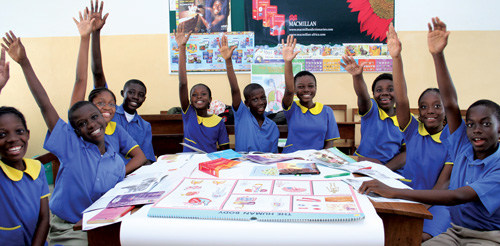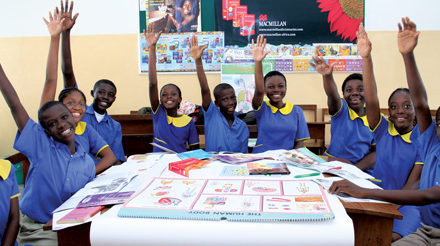
Keeping learners in school: An outbreak investigation of COVID-19 in schools

By CDC Namibia.
Children across the world have missed out on months of schooling during the COVID-19 pandemic. In Namibia, the Ministry of Education, Arts and Culture (MoEAC) ended the second term early and introduced a winter break when a third wave of the COVID-19 pandemic hit Namibia. With the third term restarting on 4 August, the MoEAC, parents and children are closely watching the daily case counts.
One of the barriers to allowing all children to return to full-time education in Namibia has been ongoing case reports of hotspot COVID-19 outbreaks in schools. In order to understand how and why these outbreaks were occurring despite prevention protocols in place, the Ministry of Health and Social Services (MoHSS) Epidemiology Division conducted an outbreak investigation of COVID-19 infections in 31 schools across Namibia in eight regions.
Through support from the U.S. Centers for Disease Control and Prevention, Africa Field Epidemiology Network (AFENET) and UNICEF, teams were dispatched to eight of the highest COVID-burden regions in April to assess the epidemiology of these outbreaks and to understand the “person, place and time” of these outbreaks. After two weeks in the field, the team returned to their offices to analyse the data and develop a list of recommendations to share with the Ministry of Education, Arts and Culture.
The most important finding established by the rapid assessment was that outbreaks in schools occur in parallel with cases in the community. This means that schools are not isolated super-spreader venues but rather part of the bigger picture of community transmission.
“The findings of the outbreak investigation show that schools can be COVID-19 safe for learners. But we can make them safer if we implement stricter measures in the communities. Shops, healthcare facilities and other public places need to make sure they follow all infection control practices and public health regulations,” said Iyaloo Mwaningange, Deputy Director of the Epidemiology Division at the Ministry of Health and Social Services.
The field team also found that COVID-19 outbreaks in schools were more common in schools that had a hostel than those without. They also observed that when cases occur in hostels, there is limited spread to day learners as cases are often quickly detected and isolated. The results showed that transmission from the community may occur when learners staying in the hostels visit the local healthcare facility, or visit local shops to buy toiletries or other items they need. Cases are more likely to occur in areas where community prevention protocols, such as people wearing masks, ensuring sufficient ventilation, and people keeping apart when they queue, are not being followed.
The outbreak investigation confirmed the observation that children living in school hostels are at greatest risk of COVID-19 infection. However, there are no easy solutions to this as learners live in the school hostels when the distance to travel to school is too far. In the most extreme cases, children can live more than 300km from the nearest school. Even living 10km from a school can be too far if the families do not have the transport to get to the school.
While the schools have made every effort to implement COVID-19 prevention strategies in the hostels, the nature of this “home” environment makes it difficult to ensure that these children wear masks and keep their distance all of the time. Furthermore, the recommendation to reduce class sizes is not compatible with the hostel set up as it means that these learners then have even more time in an environment, where if present, COVID-19 is more likely to spread than in the classroom. Shutting the hostels is also not an option as they meet the needs of families that would otherwise be unable to send their children to school. There has been no easy solution to this dilemma, and the need to understand this situation better spurred on the partnership between the Ministries of Education, Arts and Culture and Health and Social Services to investigate the COVID-case outbreaks in school and to make new recommendations for learner education in Namibia during the COVID-19 pandemic. The Integrated School Health Programme presents a great opportunity to build on this collaboration between the health and education sectors during the outbreak, sustain safe operations of schools through the prevention, early detection and control of COVID-19, and mitigate adverse impacts on mental health and psychosocial wellbeing.
The outbreak investigation also found that in many cases, schools and teachers are adhering to COVID-19 prevention protocols. Many teachers model good mask etiquette and require their learners to do the same. Handwashing facilities have also been provided in many schools, often through simple means such as the use of tippy taps. While there were some cases where teachers and learners were not paying sufficient attention to prevention protocols, these lapses were addressed through group meetings and increased training and information.
The Namibian schools are now preparing to start the third trimester. Based on the results of the outbreak investigation, the MoEAC has reminded schools to emphasize the importance of handwashing, wearing a mask, distancing and ventilation in the classrooms. Schools must also ensure there is increased monitoring at hostels and staff should also receive refresher training on COVID-19 prevention. The Ministry of Education, Arts and Culture in partnership with the Namibian Teachers Union (NANTU) is also encouraging teachers to get vaccinated against COVID-19 for their own protection and to reduce the risk of spreading the virus to other people.
“The outbreak investigation has shown us that there are ways to keep learners safe while they are at school,” said Ayesha Wentworth, a Director at the Ministry of Education. “Keeping children out of school for long periods of time is not a solution. It places children in vulnerable situations, and the lost learning time will have serious long-term implications.”
“Children benefit in many ways from being in the school setting,” said Acting Country Director for CDC Namibia, Dr. Steven Hong. “The children have everything to gain from being back at school. We encourage schools to put in place all the preventative measures, including proper masking and distancing, good ventilation of classrooms by opening windows and doors, and regular handwashing, and we wish everyone well in the preparations for the third term.”












































